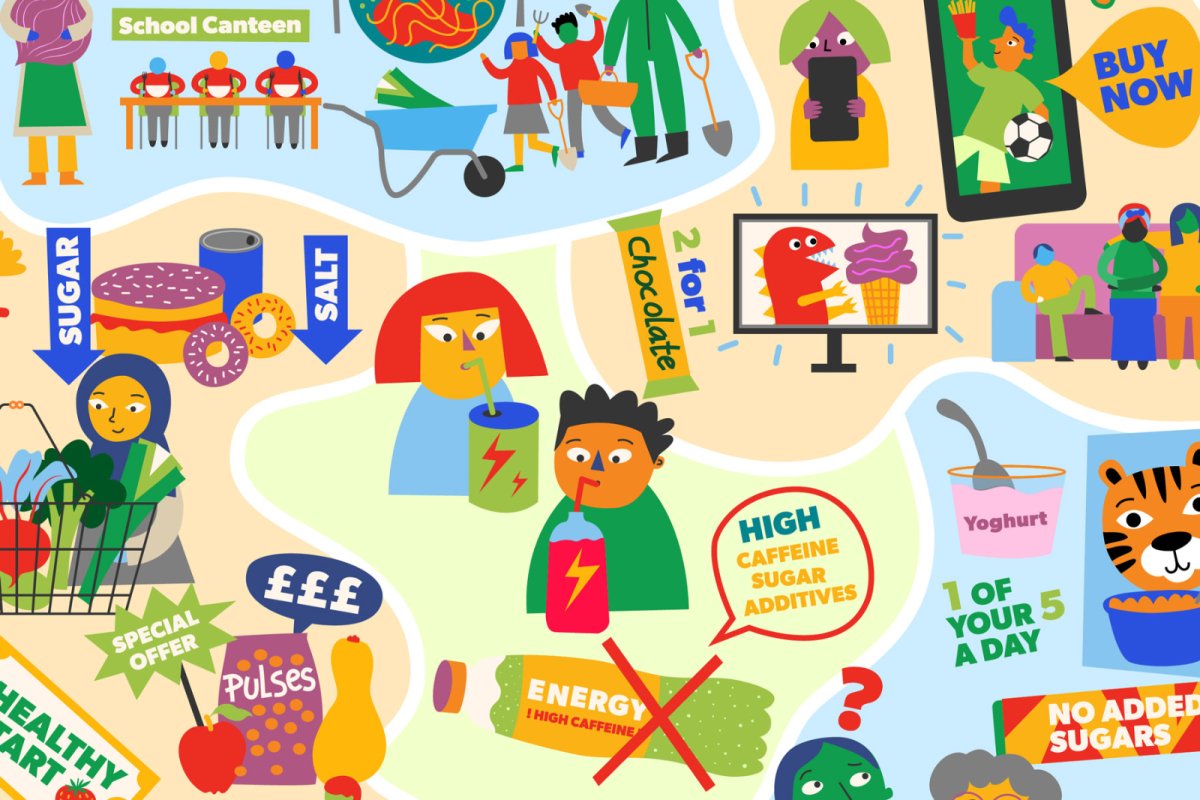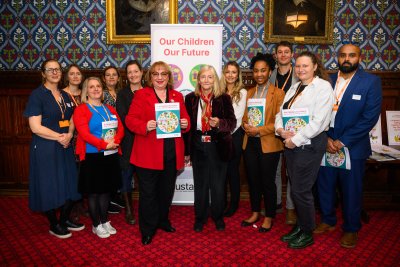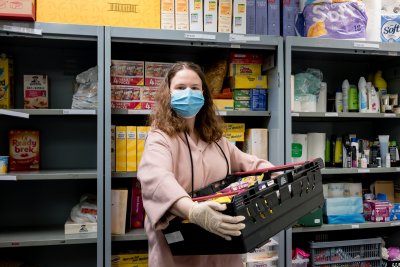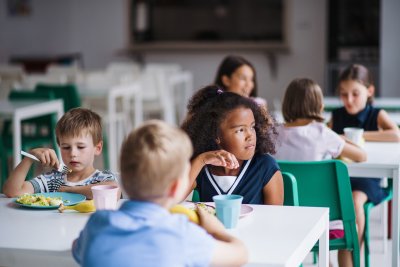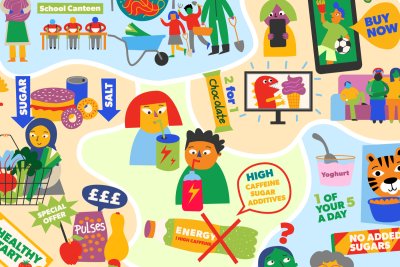 Childrens Food Illustration. Credit: Sustain
Childrens Food Illustration. Credit: Sustain
New parents' manifesto calls for action on children's healthy food
As two thirds of parents worry about what their children are eating, the Children's Food Campaign has launched Our Children, Our Future, a new parents' manifesto for government action on healthy children's food, calling for action in five key policy areas.
Nearly 8 in 10 parents (76%) are finding it harder, not easier, when it comes to promoting healthy eating habits with their children. The findings come from comprehensive polling of over 2,000 parents conducted by Savanta* and the Children’s Food Campaign at Sustain to help determine the biggest challenges faced by parents in the current food system and their top priorities for change.
- While most parents (88%) prioritise their children eating healthily, more than two thirds worry about what their children are actually eating and say it’s challenging getting their kids to eat healthily.
- From cost-of-living pressures to food marketing and labelling, the research highlights multiple issues that make parents’ job harder, and where further policies are needed to support them.
The Children's Food Campaign has worked with 13 parent ambassadors to feed their experience and ideas plus the research findings into their own manifesto Our Children, Our Future. The manifesto calls on all political parties to put children’s healthy food at the heart of their plans in the run up to the General Election later this year.
The manifesto, which will be delivered in person by a delegation of parents to Parliament following the next General Election, has identified five pillars of action. It calls on government to:
- Make free, healthy and sustainable school food a priority for all our children from nursery to sixth form/college
- Protect children from the flood of unhealthy food advertisement and marketing
- Ensure honest and trustworthy information on food and drink packaging
- Make nutritious food affordable and accessible for all families
- Stop the sale of high energy caffeine drinks to children
Download the full manifesto here
Add your name to the manifesto
Join parents in calling on all political parties to prioritise children’s health and future. We aim to present this manifesto alongside a list of every person who's shown their support once the new government has been selected.
Jaynaide Powis, Children's Food Ambassador and parent of a 22 month old child says:
“As parents, we do our best to ensure that the food our children eat is nourishing, healthy and enjoyable yet our abilities and intentions as parents are too often restricted by means beyond our control. Without doubt, any government cannot afford, morally or financially, to leave any children behind and parents must be able to trust that the food they buy is healthy. This way we can feed our children knowing that their health and wellbeing is a priority and ensure that nutritious food is always the default.”
Barbara Crowther, Children’s Food Campaign Manager at Sustain adds:
“It should be easy for children to eat healthily but the reality is it’s not. Parents are battling daily against a barrage of unhealthy marketing campaigns, pricing barriers and confusing messaging. With many parents worrying about what their children are eating and say it’s getting more difficult to ensure their children are accessing healthy food, we call on policy makers and all political parties to put aside arguments of nanny statism and listen to what support parents really need so that together, we can put children’s health at the heart of their future.”
Crossbench Peer, Baroness Rosie Boycott, who has written a foreword to the manifesto says:
“There’s been lots of debate about the nanny state. Personally, I like the idea of a parent state. A parent state is one that fights to the death to protect its children from anything that might harm them.”
The parent ambassadors who have led the creation of the manifesto will be launching it via a webinar on Thursday 25 April, where they will be joined by experts from School Food Matters, online parenting forum Netmums and young people's campaigning group Bite Back.
Louise Burke, Editorial Director at Netmums, says:
We hope this manifesto acts as a wake-up call to the government that parents want to be both empowered and supported to enable their children to eat healthily. Furthermore, parents want to see all stakeholders play a part - whether this is via school meal provision, food education, clearer labelling on foods or restrictions around aggressive marketing - there is wide recognition that parents can't tackle this alone."
Parents overwhelmingly call for expansion of healthy school food
- Expansion of healthy school meals is the number one policy backed by 86% of parents in the poll, who overwhelmingly want all children to be able to access healthy meals without stigma.
- While school food has improved dramatically in some places, it’s not universal. Just over half of parents (55%) think the food in their children’s school is nutritious and appealing.
- Parents strongly want to see more healthy options on menus (89%), a reduction of sugary puddings in favour of fruit and yoghurt (84%) and stronger enforcement and inspection of School Food Standards (80%) to make sure food on the plate is nutritious, balanced and appealing.
Stephanie Slater, Founder and Chief Executive, School Food Matters says:
“It’s so exciting to see parents mobilising to make school food tasty, nutritious and available to all. The campaign to make nutritious food available to every child in every school is gaining momentum. With a bit of parent power, we might just get this investment in children’s health across the line.”
Protecting children from unhealthy food advertising and marketing
As children are growing up in a landscape awash with highly processed foods containing excessive amounts of salt, sugar and fat from our high streets, supermarket shelves and unhealthy food advertisements, the research highlights multiple barriers making it harder for parents.
- 9 in 10 parents (88%) say their children are influenced by unhealthy food advertising
- 2 in 3 parents are worried by the amount of advertising their children are seeing
- 2 in 3 parents (66%) support the introduction of a 9pm watershed and online ban on unhealty food advertising.
The Government’s delay to the introduction of a 9pm watershed restriction for TV and online adverts for HFSS products (which is now scheduled to come into force from 1 October 2025).
Caroline Cerny, Director of Policy and Engagement at youth campaigning organisation Bite Back, says:
"Every parent wants the best for their child, but they are up against a food system rigged against children's health. Policies that redress this balance, such as ending marketing tactics on packaging of unhealthy food and restricting junk food adverts are a no brainer and rooted in strong evidence. Government action is long overdue."
Make healthy food more affordable for parents, and unhealthy food less available
- The cost of living is cited as the issue of highest concern by 75% of parents, with food prices (69%) as the biggest pressure, ahead of housing, fuel or other bills.
- Four in five parents (80%) support the Government to expand more access to programmes, such as Healthy Start, providing vouchers to low-income families to buy more fruit and vegetables.
- Three in four parents (73%) want the Government to mandate companies to reduce the amounts of salt and sugar in food and drink
- Four in five parents (80%) support the introduction of a ban on sales of energy drinks to under-16s. This was a pledge made by the Government in 2019 following a comprehensive public consultation in which 93% of respondents, including major supermarkets, backed the move.
More honest, trustworthy packaging and labelling
There is also growing concern among parents about the amount of ultra-processed foods available to children. Over 65% of children’s daily energy intake comes from ultra-processed foods, yet it is very difficult to tell when a product is ultra-processed by looking at the packaging.
Additionally, the use of child-friendly characters on food and drink packaging creates another challenge for parents.
- Two thirds of parents think child-friendly characters on food and drink packaging make it more difficult to feed their children a healthy diet
- 9 out of 10 parents agree that the use of child-friendly characters results in children asking for the product.
- While 3 in 5 parents say they trust manufacturer-led health claims, 8 in 10 parents (79%) want the government to improve labelling on children’s products.
Louise Burke, Editorial Director at Netmums, adds:
"Parents consistently tell us that feeding their children nutritious and affordable meals is a huge priority, which is evidenced by the sheer amount of questions and conversations on our forum around feeding the family. Food-related content is one of the most searched-for topics on the Netmums site, with parents actively seeking healthy recipes, lunchbox ideas and peer-to-peer guidance on how to steer their children towards a healthier lifestyle.
"But sourcing accessible and nutritious food at an affordable price for the family isn't so easy, particularly with the ongoing challenge of the cost of living. In addition to this, families - and I include my own here - feel overwhelmed by the conflicting messages and unclear guidelines around whether they should prioritise less sugar, less fat, smaller portions or less processed offerings."
Read more findings from the polling
Notes to Editors
* Fieldwork was conducted by the data, market research and advisory company Savanta. Savanta surveyed 2,039 parents of children aged 0-18 online between 2-11 January 2024. Data were weighted by gender and socio-economic groups to be representative of the UK population. Savanta is a member of the British Polling Council and abides by its rules.
Sign the parents' manifesto for change!
Join parents in calling on all political parties to prioritise children’s health and future. We aim to present this manifesto alongside a list of every person who's shown their support once the new government has been selected.
Children's Food Campaign: Better food and food teaching for children in schools, and protection of children from junk food marketing are the aims of Sustain's high-profile Children's Food Campaign. We also want clear food labelling that can be understood by everyone, including children.
Sustain
The Green House
244-254 Cambridge Heath Road
London E2 9DA
020 3559 6777
sustain@sustainweb.org
Sustain advocates food and agriculture policies and practices that enhance the health and welfare of people and animals, improve the working and living environment, promote equity and enrich society and culture.
© Sustain 2024
Registered charity (no. 1018643)
Data privacy & cookies
Icons by Icons8
